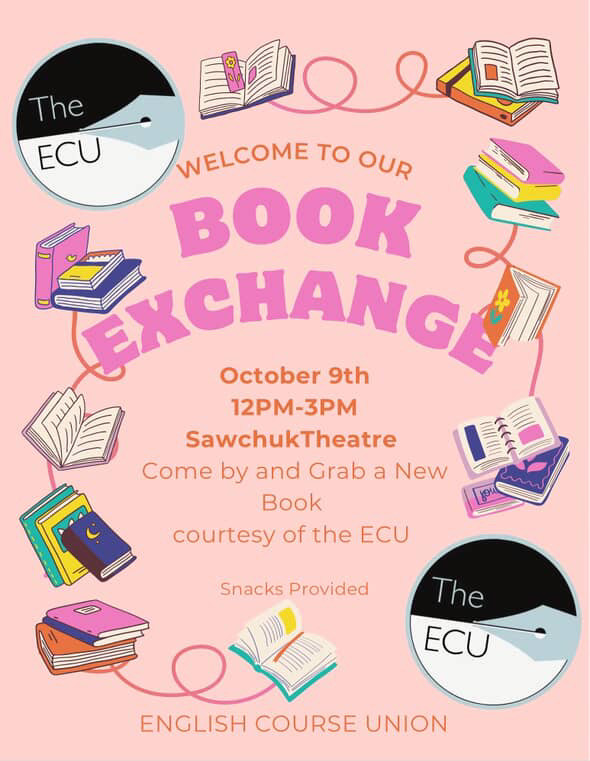
On Thursday, October 9, in between classes and a hectic schedule, I was walking through the library and stopped short at the Sawchuk Theatre.
Books.
Stacks and stacks of books sprawled across tables. Poetry, literature, romance, psychological thriller, memoirs, how-to-write, how-to-live, recipes…just so many books.
Hosted by the SUO’s English Course Union (ECU), the Book Exchange invited students to take or leave any book they liked — no sign-ups, no fees, just a few tables filled with stories waiting for new readers.
As students, most of our reading happens online. PDFs, e-textbooks, and digital articles are squeezed into already busy tabs. They are convenient, cheaper, and always within reach. But it also makes reading feel mechanical: something to skim, highlight, and close. Holding a physical book is different. It asks for your full attention.
There is something so comforting about the smell of the pages, the feel of the dust jacket, and the way the words are read. With a book exchange like this, where you get to try out a second-hand book, it turns reading into a shared experience — a folded page, little doodles, an underlined sentence.
The idea behind the ECU’s event is simply to give books a second life. Whether it’s a novel read for a first-year literature class or a thrift-store find, each one carries a story — not just in its pages, but in the hands that pass it on.
One ECU member at the event said the turnout this year was strong, with students not just taking books but stopping to talk about them. For many, it was also a chance to pick up free reading material during a time when affordability is a growing concern. The exchange helps keep books out of waste bins and puts them into the hands of new readers, like an act of sustainability in a world of rising costs and fleeting digital consumption. It is small, but it matters.
There is also something exciting about knowing that a book you once owned might end up in someone else’s backpack, folded pages and annotations, still being read. It’s an act of generosity, especially in a semester where textbooks cost hundreds of dollars and most “free” readings live behind paywalls. The Book Exchange reminds students that access to stories does not have to depend on budgets or bookstore receipts.
When I looked through the piles, I found The Boleyn Inheritance by Philippa Gregory. Its spine was a little worn, the cover slightly bent (fitting, for a piece of historical fiction). It was not a book I had gone looking for — I did not even know I wanted it — but that is what makes this event special. There is something wonderfully simple about stumbling upon a random book: flipping through its pages, reading the blurb, and deciding whether it is something you want to read, something that feels like yours to keep.
Events like this remind us that reading does not always have to be academic or structured. Between deadlines and screens, we forget that books can still exist outside of syllabi. There’s something restorative about reading for no reason — not for a grade, not for research, but just because a story caught your eye at a table in the library.
The English Course Union has hosted events like book clubs, balls, and movie nights, but the Book Exchange stands out because of how simple and low-pressure it is. There’s no expectation to do anything but browse, pick something up, and maybe leave something behind. In a way, it mirrors what English itself teaches: how stories move, connect, and change depending on who holds them.
The ECU represents students in the department of English and Cultural Studies at UBC Okanagan and is known for building a close-knit community of readers and writers. Along with the Book Exchange, they host a range of events throughout the year, from their book club and cozy movie nights to themed gatherings like the Halloween Gala and Fairytale Ball. Each event offers students a space to connect, share ideas, and celebrate their love of stories. Follow @ecu_ok on Instagram for event announcements and updates.
Underneath it all, events like these are about connection. Beyond sustainability and affordability, there’s the joy of finding your community and meeting like-minded people. A book exchange or club is just one version of that, but sometimes it’s simpler — noticing someone reading a title you love, swapping recommendations, or lending a copy you swear by. It’s a small, human thread that ties readers together, even when they’ve never met.
In a campus filled with laptops and PDFs, the Book Exchange was an incredible reminder that stories are not just things we consume; they are things we share.



